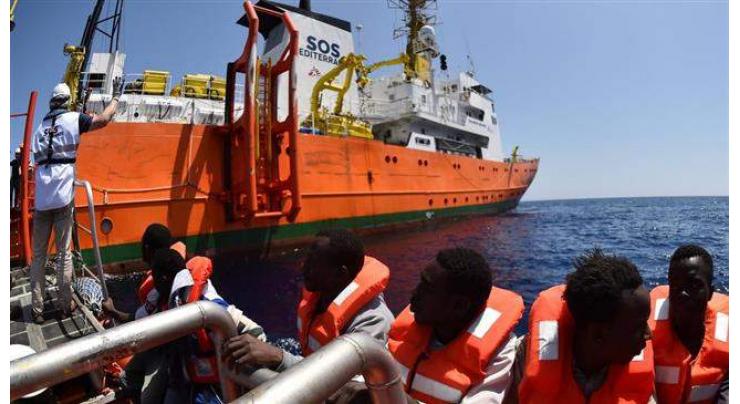
- Home
- World
- News
- IFRC Migration Lead Concerned Over States' Refusal to Let Rescue Ships Disembark Migrants
IFRC Migration Lead Concerned Over States' Refusal To Let Rescue Ships Disembark Migrants
Mohammad Ali (@ChaudhryMAli88) Published September 25, 2018 | 05:20 PM

Refusals to let people rescued at sea disembark does not resolve the issue of migration, while migrants keep dying over an insufficient number of rescue operations, Tiziana Bonzon, the migration and displacement lead at the International Federation of the Red Cross (IFRC), told Sputnik.
MOSCOW (UrduPoint News / Sputnik - 25th September, 2018) Refusals to let people rescued at sea disembark does not resolve the issue of migration, while migrants keep dying over an insufficient number of rescue operations, Tiziana Bonzon, the migration and displacement lead at the International Federation of the Red Cross (IFRC), told Sputnik.
"Building new barriers or not allowing rescued people to safely disembark, does not solve the issue. People who move for different reasons continue to take increasing risks and die in the Mediterranean, also because of fewer search and rescue operations," Bonzon said.
Earlier this year, Italy and Malta refused to let several ships that rescued migrants at sea dock in their ports.
The IFRC Migration lead stressed that while a number of arrivals to Europe are still recorded, there has been a substantial decrease in comparison with 2016 and 2017. However, according to data from the International Organization for Migration, proportion of fatalities per crossings has increased. In 2016, one in 88 migrants using the central Mediterranean route were reported dead or missing, while in 2017 this number increased to one in 36. Many of these events are not reported or recorded, according to Bonzon.
Bonzon remarked that states should be responsible for portraying a more unified front on the issue of migration.
"States should work together to reconcile different interests and show more solidarity. They should work with humanitarian actors to ensure lives are saved and that vulnerable migrants have access to essential services," Bonzon said.
Bonzon stated that the perception that there was an unmanageable influx of refugees and migrants to European countries was false.
"There are perceptions in Europe that the arrival of migrants and refugees is not manageable. However, figures show that arrivals have decreased. We should also acknowledge that other countries such as Lebanon or Turkey continue to host very large refugee and migrant populations and that more solidarity is expected," Bonzon said.
The IFRC lead remarked that legal pathways should be implemented to deter migrants from resorting to unsafe channels.
"We can only welcome that legal pathways are implemented, better expanded rather than taking a more restrictive approach to migration. If people are offered opportunities to migrate safely and through regular channels, they would not have to turn to illicit practices such as smuggling," Bonzon said.
The UN Migration Agency said earlier this week that the total number of migrant arrivals by sea in Italy went down from 181,436 in 2016 to 119,369 in 2017. In the period between January 1 and September 16 this year, a total of 20,777 people arrived in Italy via the Mediterranean Sea.
In Greece, the number of sea arrivals dropped from 173,614 in 2016 to 29,595 in 2017. In the first eight and a half months of 2018, 22,153 people arrived in Greece via the Mediterranean.
At the same time, the number of arrivals by sea in Spain increased from 8,162 in 2016 to 22,108 in 2017. A total of 33,611 migrants arrived in Spain in the period between January 1 and September 16 this year via the Mediterranean Sea.
Related Topics
Recent Stories

Senate continues discussion on Presidential address to Joint Sitting of Parliame ..

Masood Khan calls for Pak-US cooperation for regional peace

Interior Minister starts Margalla Trail Patrol for security

Currency Rate In Pakistan - Dollar, Euro, Pound, Riyal Rates On 26 April 2024

Today Gold Rate in Pakistan 26 April 2024

ICC Womens T20 World Cup Qualifier, Match 2: Ireland Women open with Comfortable ..

Robinson, bowlers help New Zealand go 2-1 up against Pakistan

Shahzeb Chachar to hold khuli kachehri on April 26

Heatwave amid Israel's aggression in Gaza brings new misery, disease risk

Tourism must change, mayor says as Venice launches entry fee

Court adjourns Judicial Complex attack case till May 17

Nasreen Noori’s book ‘Popatan Jahra Khwab’ launched
More Stories From World
-
Singapore expects 1-3 pct growth this year
5 minutes ago -
Hong Kong's Hang Seng Tech Index rises over 5 pct
5 minutes ago -
New Zealand business sector R&D expenditure hits 2.21 bln USD
5 minutes ago -
3 dead after mini car falls into west Japan paddy field
6 minutes ago -
Chinese shares higher at midday Friday
6 minutes ago -
Myanmar plans to export 2,000 tons of coffee in 2024-25 fiscal year
16 minutes ago
-
Chinese shares close higher Friday
16 minutes ago -
Pro-Palestinian US campus protests grow as police crack down
36 minutes ago -
Miner Anglo American rejects BHP's $38.8 bn takeover bid
46 minutes ago -
Guatemala prosecutors raid international NGO over alleged child abuse
56 minutes ago -
Another State Dept official resigns over US' Gaza policy amid growing student protests
56 minutes ago -
Togo leader Gnassingbe follows father's political playbook
1 hour ago